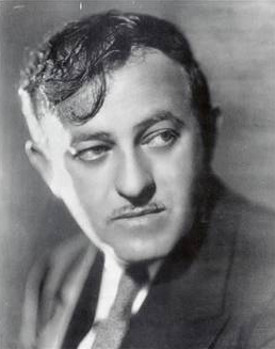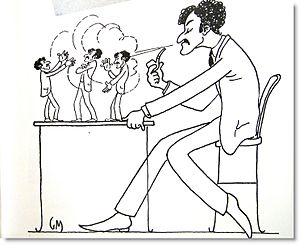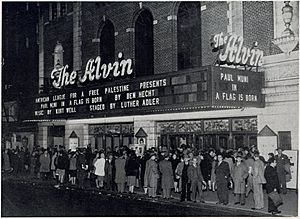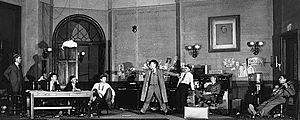Ben Hecht facts for kids
Quick facts for kids
Ben Hecht
|
|
|---|---|

Hecht in 1945
|
|
| Born | February 28, 1894 New York City, U.S.
|
| Died | April 18, 1964 (aged 70) New York City, U.S.
|
| Occupation |
|
| Style | Comedy, newspapers, gangster |
| Spouse(s) | Marie Armstrong (m. 1915; divorced) Rose Caylor
(m. 1926) |
| Children | 2 |
Ben Hecht (/hɛkt/; February 28, 1894 – April 18, 1964) was an American screenwriter, director, producer, playwright, journalist, and novelist. A successful journalist in his youth, he went on to write 35 books and some of the most enjoyed screenplays and plays in America. He received screen credits, alone or in collaboration, for the stories or screenplays of some seventy films.
Hecht received the first Academy Award for Best Story for Underworld (1927). Many of the screenplays he worked on are now considered classics. He also provided story ideas for such films as Stagecoach (1939). Film historian Richard Corliss called him "the Hollywood screenwriter", someone who "personified Hollywood itself". In 1940, he wrote, produced, and directed Angels Over Broadway, which was nominated for Best Screenplay. In total, six of his movie screenplays were nominated for Academy Awards, with two winning.
In 1954, Hecht published his highly regarded autobiography, A Child of the Century. According to it, he did not hold screenwriting (in contrast to journalism) in high esteem, and never spent more than eight weeks on a script. In 1983, 19 years after his death, Ben Hecht was posthumously inducted into the American Theater Hall of Fame.
Contents
Early years
Hecht was born in New York City, the son of Belarusian-Jewish immigrants. His father, Joseph Hecht, worked in the garment industry. His father and mother, Sarah Swernofsky Hecht, had emigrated to New York from Minsk, Russian Empire. The Hechts married in 1892.
The family moved to Racine, Wisconsin, where Ben attended high school. For his bar mitzvah, his parents bought him four crates full of the works of Shakespeare, Dickens and Twain. When Hecht was in his early teens, he would spend the summers with an uncle in Chicago. On the road much of the time, his father did not have much effect on Hecht's childhood, and his mother was busy managing a store in downtown Racine. Film author Scott Siegal wrote, "He was considered a child prodigy at age ten, seemingly on his way to a career as a concert violinist, but two years later was performing as a circus acrobat".
After graduating from Racine High School in 1910, Hecht attended the University of Wisconsin for three days before leaving for Chicago at the age of 16 or 17. He lived with relatives, and started a career in journalism. By age seventeen Hecht was a full-time reporter, first with the Daily Journal, and later with the Chicago Daily News. He was an excellent reporter who worked on several Chicago papers. In the aftermath of World War I, Hecht was sent to cover Berlin for the Daily News. There he wrote his first and most successful novel, Erik Dorn (1921). It was a sensational debut for Hecht as a serious writer.
The 1969 movie, Gaily, Gaily, directed by Norman Jewison and starring Beau Bridges as "Ben Harvey", was based on Hecht's life during his early years working as a reporter in Chicago. The film was nominated for three Oscars. The story was taken from a portion of his autobiography, A Child of the Century.
Writing career
In 1921, Hecht inaugurated a Daily News column, One Thousand and One Afternoons in Chicago. While it lasted, the column was enormously influential. After concluding One Thousand and One Afternoons, Hecht went on to produce novels, plays, screenplays, and memoirs.
After World War I he was sent by the Chicago Daily News to Berlin to witness the revolutionary movements, which gave him the material for his first novel, Erik Dorn (1921). After leaving the News in 1923, he started his own newspaper, The Chicago Literary Times.
In 1954, Hecht published his autobiography, A Child of the Century, which, according to literary critic Robert Schmuhl, "received such extensive critical acclaim that his literary reputation improved markedly during the last decade of his life ... ".
His first full-length play, The Egotist, was produced in New York in 1922. While living in Chicago, he met fellow reporter Charles MacArthur and together they moved to New York to collaborate on their Chicago-crime-reporter themed play, The Front Page. It was widely acclaimed and had a successful run on Broadway of 281 performances, beginning August 1928. In 1931, it was turned into a successful film, which was nominated for three Oscars.
Working in Hollywood
Hecht arrived in Los Angeles and began his career at the beginning of the sound era by writing the story for Josef von Sternberg's gangster movie Underworld in 1927. For that first screenplay and story, he won an Academy Award for Best Original Screenplay in Hollywood's first Academy award ceremony. Soon afterward, he became the "most prolific and highest paid screenwriter in Hollywood".
Hecht spent from two to twelve weeks in Hollywood each year, "during which he earned enough money (his record was $100,000 in one month, for two screenplays) to live on for the rest of the year in New York, where he did what he considered his serious writing", writes film historian Carol Easton. Nonetheless, later in his career, "he was a writer who liked to think that his genius had been stifled by Hollywood and by its dreadful habit of giving him so much money".
Hecht became one of Hollywood's most prolific screenwriters, able to write a full screenplay in two to eight weeks. According to Samuel Goldwyn biographer, Carol Easton, in 1931, with his writing partner Charles MacArthur, he "knocked out The Unholy Garden in twelve hours.
Styles of writing
Hecht was best known for two specific and contrasting types of film: crime thrillers and screwball comedies. Among crime thrillers, Hecht was responsible for such films as The Unholy Night (1929), the classic Scarface (1932), and Hitchcock's Notorious. Among his comedies, there were The Front Page, which led to many remakes, Noël Coward's Design for Living (1933), Twentieth Century, Nothing Sacred, and Howard Hawks's Monkey Business (1952).
Hecht's films had a lively sense of humor and fast-paced plots.
Personal life
Hecht married Marie Armstrong (1892–1956), a gentile, in 1915, when he was 21, and they had a daughter, Edwina, who became actress Edwina Armstrong (1916–1991). He later met Rose Caylor, a writer, and together they left Chicago (and his family) in 1924, moving to New York. He was divorced from Armstrong in 1925. He married Caylor that same year, and they remained married until Hecht's death in 1964.
On July 30, 1943, Ben and Rose had a daughter, Jenny Hecht, who became an actress at the age of 8. She died on March 25, 1971, at the age of 27, shortly after completing her third movie appearance. A play about Jenny's brief life, The Screenwriter's Daughter by Larry Mollin, was staged in London in October 2015.
Civil rights activism
Hecht became active in promoting civil rights early in his career. He wrote enough stories about black-white dynamics to form a small collection. He broke taboos by publishing a regular column, Black-belt Shadows, about Chicago and broader AfroAmerica by young William Moore. A factor in his willingness to work with blacks on occasion was his first playwriting experience: his collaborator was a young black student.
Hecht film stories featuring black characters included Hallelujah, I'm a Bum. Hecht's most important race film historically was the Frank Capra message film The Negro Soldier, a feature-length tribute shown to the armed forces and civilians during World War II.}}
Interesting facts about Ben Hecht
- Besides working on novels and short stories, he has been credited with ghostwriting books, including Marilyn Monroe's autobiography My Story. Hecht himself, however, kept denying it publicly.
- Among the better-known films he helped write without being credited are Gone with the Wind, The Shop Around the Corner, Foreign Correspondent, His Girl Friday (the second film version of his play The Front Page), The Sun Also Rises, Mutiny on the Bounty, Casino Royale (1967), and The Greatest Show on Earth.
- In July 1941, Hecht was among a number of signers of a formal statement, calling for the "utmost material assistance by our government to England, the Soviet Union, and China" in World War II.
- Following the war, Hecht openly supported the Jewish insurgency in Palestine.
Academy Award nominations
| Year | Category | Work | Result |
|---|---|---|---|
| 1927/28 | Best Writing (Original Story) | Underworld | Won |
| 1934 | Best Adaptation | Viva Villa! | Nominated |
| 1935 | Best Original Story | The Scoundrel | Won |
| 1939 | Best Screenplay | Wuthering Heights | Nominated |
| 1940 | Best Original Screenplay | Angels Over Broadway | Nominated |
| 1946 | Best Original Screenplay | Notorious | Nominated |
Screenplays
- Kiss of Death (1995)
- Casino Royale (1967) (uncredited)
- Circus World
- 7 Faces of Dr. Lao (uncredited)
- Cleopatra (1962) (uncredited)
- Billy Rose's Jumbo
- Mutiny on the Bounty (1962) (uncredited)
- Walk on the Wild Side (uncredited)
- North to Alaska (uncredited)
- John Paul Jones (uncredited)
- The Gun Runners (uncredited)
- Queen of Outer Space
- Legend of the Lost
- The Sun Also Rises (1957)
- A Farewell to Arms (1957)
- Miracle in the Rain
- The Iron Petticoat
- The Hunchback of Notre Dame (1956) (uncredited)
- Trapeze (1956) (uncredited)
- The Court-Martial of Billy Mitchell (uncredited)
- The Indian Fighter
- The Man with the Golden Arm (1955) (uncredited)
- Guys and Dolls (uncredited)
- Living It Up (based on his play Hazel Flagg)
- Ulysses (1955)
- Light's Diamond Jubilee (television)
- Terminal Station (1953) (uncredited)
- Angel Face (1952) (uncredited)
- Hans Christian Andersen (uncredited)
- Monkey Business (1952)
- Actors and Sin (1952) (also directed and produced)
- The Wild Heart (1952) (uncredited)
- The Thing from Another World (uncredited)
- The Secret of Convict Lake (uncredited)
- Strangers on a Train (1951) (uncredited)
- September Affair (uncredited)
- Where the Sidewalk Ends (1950)
- Edge of Doom (uncredited)
- Perfect Strangers (1950)
- Love Happy (uncredited)
- The Inspector General (uncredited)
- Whirlpool (1950)
- Roseanna McCoy (uncredited)
- Big Jack (uncredited)
- Portrait of Jennie (uncredited)
- Cry of the City (uncredited)
- Rope (1948) (uncredited)
- The Miracle of the Bells
- Dishonored Lady (uncredited)
- Her Husband's Affairs
- The Paradine Case (1947) (uncredited)
- Ride the Pink Horse (1947)
- Kiss of Death (1947)
- Duel in the Sun (1946) (uncredited)
- Notorious (1946)
- A Flag is Born
- Specter of the Rose (1946) (also directed and produced)
- Gilda (uncredited) (1946)
- Cornered (1945) (uncredited)
- Spellbound (1945)
- Watchtower Over Tomorrow (1945 OWI film)
- Lifeboat (1944) (uncredited)
- The Outlaw (1943) (uncredited)
- China Girl (1942)
- Journey into Fear (1943) (uncredited)
- The Black Swan (1942)
- Ten Gentlemen from West Point (uncredited)
- Roxie Hart (uncredited)
- Lydia
- The Mad Doctor (1941) (uncredited)
- Comrade X
- Second Chorus (uncredited)
- Angels Over Broadway (1940) (also directed and produced)
- Foreign Correspondent (1940) (final scene-uncredited)
- The Shop Around the Corner (1940) (uncredited)
- His Girl Friday (1940)
- I Take This Woman (1940) (uncredited)
- Gone with the Wind (1939) (uncredited)
- At the Circus (uncredited)
- Lady of the Tropics
- It's a Wonderful World (1939)
- Wuthering Heights (1939)
- Let Freedom Ring
- Stagecoach (1939) (uncredited)
- Gunga Din (1939)
- Angels with Dirty Faces (1938) (uncredited)
- The Goldwyn Follies
- Nothing Sacred (1937)
- The Hurricane (1937) (uncredited)
- The Prisoner of Zenda (1937) (uncredited)
- Woman Chases Man (uncredited)
- King of Gamblers (uncredited)
- A Star Is Born (1937) (uncredited)
- Soak the Rich (also directed)
- The Scoundrel (1935) (also directed)
- Spring Tonic
- Barbary Coast
- Once in a Blue Moon (1935) (also directed)
- The Florentine Dagger
- The President Vanishes (uncredited)
- Crime Without Passion (1934) (also directed)
- Shoot the Works
- Twentieth Century (1934) (uncredited)
- Upperworld
- Viva Villa! (1934)
- Riptide (1934) (uncredited)
- Queen Christina (1933) (uncredited)
- Design for Living (1933)
- Turn Back the Clock
- Topaze (1933)
- Hallelujah, I'm a Bum (1933)
- Back Street (1932) (uncredited)
- Rasputin and the Empress (1932) (uncredited)
- Million Dollar Legs (1932) (uncredited)
- Scarface (1932)
- The Beast of the City (1932) (uncredited)
- The Unholy Garden (1931)
- The Sin of Madelon Claudet (1931) (uncredited)
- Monkey Business (1931) (uncredited)
- Homicide Squad (1931) (uncredited)
- Quick Millions (1931) (uncredited)
- Le Spectre vert
- Roadhouse Nights (1930)
- Street of Chance (1930)(uncredited)
- The Unholy Night (1929)
- The Great Gabbo (1929)
- The Big Noise (1928)
- The American Beauty (1916) (uncredited)
- Underworld (1927)
- The New Klondike (1926) (uncredited)
Books
- Erik Dorn (1921).
- Gargoyles (NY: Boni & Liveright, 1922.)
- Kingdom of Evil, 211pp., Pascal Covici (1924)
- Humpty Dumpty, 383 pp., Boni & Liveright (1924)
- Broken Necks {Containing More 1001 Afternoons}, 344pp., Pascal Covici (1926)
- Count Bruga, 319 pp., Boni & Liveright (1926)
- A Jew in Love, 341 pp., Covici, Friede (1931)
- The Champion from Far Away (1931)
- Actor's Blood (1936)
- The Book of Miracles, 465 pp., Viking Press (1939)
- 1001 Afternoons in New York (The Viking Press, 1941.)
- Miracle in the Rain (1943)
- A Guide for the Bedevilled, 276 pages, Charles Scribner's Sons (1944), 216 pp. Milah Press Incorporated (September 1, 1999) ISBN: 0-9646886-2-X
- I Hate Actors! (New York: Crown Publishers, 1944)
- The Collected Stories of Ben Hecht, 524 pp., Crown (1945)
- The Cat That Jumped Out of the Story, John C. Winston Company (1947)
- Cutie - A Warm Mamma, 77 pp., Boar's Head Books (1952) (co-authored with Maxwell Bodenheim)
- A Child of the Century 672 pp. Plume (1954) (May 30, 1985) ISBN
- Charlie: The Improbable Life and Times of Charles MacArthur, 242 pp., Harper (1957)
- The Sensualists (1959)
- A Treasury of Ben Hecht: Collected Stories and Other Writings (1959, anthology)
- Perfidy (with critical supplements), 281 pp. (plus 29 pp.), Julian Messner (1962); about the 1954–1955 Kastner trial in Jerusalem
- Perfidy 288 pp. Milah Press (1961), Inc. (April 1, 1997) ISBN: 0-9646886-3-8
- Gaily, Gaily, Signet (1963) (November 1, 1969) ISBN
- Concerning a Woman of Sin, 222 pp., Mayflower (1964)
- Letters from Bohemia (Garden City, NY: Doubleday & Co, 1964)
Plays
- The Hero of Santa Maria (1916)
- The Egotist (1922)
- The Stork (1925)
- The Front Page (1928)
- The Great Magoo (1932)
- Twentieth Century (1932)
- Jumbo (1935)
- To Quito and Back (1937)
- Ladies and Gentlemen (1939)
- Lily of the Valley (1942)
- Seven Lively Arts (1944)
- Swan Song (1946)
- A Flag Is Born (1946)
- Winkelberg (1958)
See also
 In Spanish: Ben Hecht para niños
In Spanish: Ben Hecht para niños




